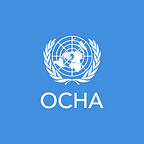Stories from aid workers who risk all to reach people in need
When we highlight the work that goes into reaching people in need, the spotlight is often on advocacy with high-level officials, Security Council members or warring parties. But much of the time, reaching people in the remote corners of crisis-affected countries comes down to the creativity, flexibility and tenacity of ordinary aid workers and local first responders.
In this piece we hear from humanitarians who have braved crocodiles in Ethiopia, navigated flooded roadways in Nigeria, and overcome logistical challenges in hurricane-hit Dominica.
Crossing a crocodile-infested river: assessing humanitarian needs in the Somali region
In September 2017, thousands of people fled their homes in Ethiopia’s Somali region after intercommunal clashes broke out. They sought safety and shelter with families in the hard-to-reach Dawa and Liben areas. Their hosts communities generously shared their meagre resources, despite having fallen on hard times themselves, after a series of crippling droughts. To best understand how to respond, a 12-member humanitarian assessment team was dispatched to Dawa and Liben in October.
The team embarked on a grueling journey, driving on poor and flooded roads for days. But on arrival, they found all roads to the affected communities blocked due to insecurity. The team, led by Abdikadir Daud, with the UN Office for the Coordination of Humanitarian Affairs, decided to enter the town via the River Dawa. The only problem? There were no boats.
The creativity of four enterprising local youths saved the day. They pieced together a make-shift raft out of wood, rope and 20 plastic jerry cans. They offered to swim alongside the contraption to propel it, at a fee of 150 Birr (about $US7) per passenger.
Abdikadir and his team cautiously accepted their offer. “All the risks we were facing came to my mind. I have limited swimming skills…and there were reportedly crocodiles in the river,” he said. “Also, the four swimmers with whom we had entrusted our lives were extremely exhausted, increasing our risk of drowning.”
But they made it across safely, allowing them to carry out their needs assessment and mobilize a response to the displaced people in Dawa and Liben.
Sweetening the deal in north-east Nigeria
In north-east Nigeria, the Boko Haram insurgency has triggered mass displacement and left millions of people in need of emergency assistance. Humanitarians try to pre-position food and other critical goods ahead of the June-to-September rainy season, when funds allow. But sustaining aid deliveries to remote areas during the rainy season is difficult and dangerous, as roads are flooded and trucks break down, risking attacks.
Determined to deliver aid throughout the rainy season, humanitarian agencies decided to offer a special payment to truck drivers to encourage them to continue operating despite the risks, and they used smaller, lighter trucks to reduce the likelihood of a breakdown. Each aid convoy is now also accompanied by a recovery vehicle and truck, as per an agreement with the Union of Road Transport Workers, to keep aid flowing. Working around these challenges enabled aid agencies to deliver more than 175,000 MT of supplies to remote locations in north-east Nigeria in 2017.
Joining-up hurricane response efforts in Dominica
In September, super-strength Hurricane Irma struck the Caribbean, causing widespread devastation. Ahead of the storm’s landfall in Dominica, humanitarian agencies pre-positioned supplies and staff to support the extensive national and regional relief efforts. A UN Disaster Assessment and Coordination (UNDAC) team was deployed to help the Government carry out needs assessments.
Audrey Janvier, an Information Manager with UNDAC, arrived in Dominica 36 hours after the hurricane hit, with her satellite phone, base maps, a mobile printer, a sleeping bag, but no tent.
She and her team-mates found a country in shock: there was no electricity, no running water, no food and very little fuel. “When we arrived, people were wandering the streets in a daze, carrying anything they could find that would hold water. Power lines were down, the river was full of debris,” said Audrey.
The UNDAC team needed to hit the ground running. With no needs assessment data yet available, the team opted to use the most recent Government census figures, which UNDAC cartographers matched with maps to determine areas with urgent food and water needs.
With so much debris in the streets, getting around was tough. Establishing a clean water supply was the number one priority. Foreign militaries brought in water deliveries and treatment units to clean water, as did firefighters from Guadeloupe but deliveries were hard as roads were blocked by debris.
Amid so much ruin there were few safe houses to sleep in so most aid groups, as well as the army, installed themselves in the Prime Minister’s headquarters. It had no electricity or running water, but was structurally safe. Due to the soaring heat, Audrey and her fellow aid workers slept on army cots on the roof at night.
In the days and weeks following the storm, Dominicans transformed their wrecked island. They cleared rubble from the roads, repaired roofs, fixed each other’s houses, and volunteered their vehicles to transport aid. A group of local engineer volunteers turned up to help coordinate medical evacuations and run radio operations. “Their response was incredibly organized and quick,” said Audrey. Soon enough, debris was cleared so militaries and aid workers could access through-roads across the islands. “When I arrived in Dominica, the streets were silent except for the news on the radio. When I left a few weeks later, you could hear the sound of music again,” said Janvier.
